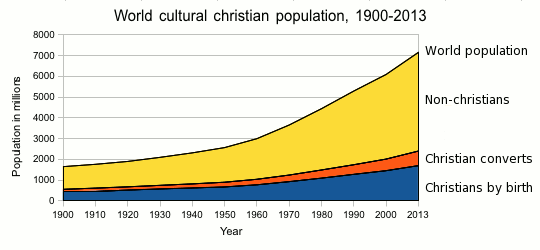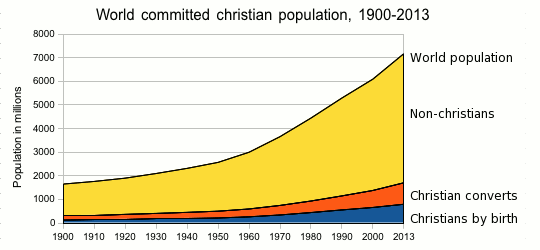
How do people get to be christians? Do many convert by their own choice, or do most just get born into christian families or christian countries
Critics of christianity sometimes point to the “fact” that most people in the world follow the religion of the country they were born into. Therefore, they argue, most people’s faith is based on geography rather than good reasons, and few people convert because they are convinced of the truth of christianity.
I couldn’t find good answers to these questions, so I did some research.
Testing the argument
The argument raises a challenging point, but it seems to fall short as an argument:
- Believing in the religion one was brought up in doesn’t make that religion wrong – or right.
- If a religion grows, as christianity has grown, it must, as a matter of sheer mathematics, start out by making converts. But as it becomes larger, the number of people born into the faith must inevitably increase. People born into christian families is a sign of the success of christianity.
- Christianity is in decline in most of the traditionally christian countries of the west (mainly Europe and North America), but is growing fast in generally non-christian countries in Asia and Africa. This suggests christianity finds it easier to make converts than to retain those born into a christian heritage.
But what are the numbers?
If you can’t find it, do it yourself
I couldn’t find the information I needed online so I decided to gather the best information and develop a population model in a spreadsheet. A more detailed description of what I did is at How many christians are converts?
How many christian converts?
I modelled two different sets of data: (1) those who self-identify as christian (cultural christians), and (2) the smaller number who attend church (committed christians). These distinctions can only be approximate, but they are understandable. I combined figures for the west (Europe and North America) and for the rest of the world to get the final global answer.
Cultural christians
Using data on the number of those who self-identified as christians, the model suggested about 30% of christians living today were converts and about 70% were born into nominally christian families or culture. (The actual numbers were just over 700 million out of a christian population of 2.4 billion.)

Committed christians
Using data on levels of church attendance (which are typically well below the number of cultural christians in western countries, but much closer in the rest of the world), about half of church-going christians living today were converts and half were born into christian families.

Christian growth in the 20th century
By 1900, christianity had become entrenched in christian culture in Europe, but it was beginning to lose numbers. But the twentieth century was also the beginning of massive growth in christianity in Africa and Asia, which continues to this day. In 1900, the west was home to more than three quarters of the world’s christians, but now it is less than a third.
This growth in Asia and Africa has been as a result of both conversions and births.
Conclusion
Clearly many christians (about 30-50%, depending on how “christians” are defined) living today are converts from a “non-christian” background. They presumably had some reason to change faiths.
Read more
- Check out the details of the data and the model at How many christians are converts?.
- Read about why many non-believers are converting at Visions of Jesus? and More healing miracles.
unkleE, I find your data interesting . As a former Christian now Deist, I find your data plausible. As to why 30 – 50% of Christians are converts, I would think that one reason would be starvation. When Missionaries are bringing food along with the “Good News” to a starving population , conversion is the obvious choice. Secondly (but not necessarily in that order) they are looking for a message of Hope from their despaire . Christianity tends to offer this. What puzzles me is why Islam as a World Religion is growing faster ? Statistics show that Islam will pass Christianity over the next 50 years or less. What do they have to offer over Christianity ?
Hi Ken, I’m not sure if I have answers, but here are some thoughts.
1. Clearly offers of food or other benefits could be an influence. But most christian aid organisations offer help regardless of belief, and most evangelism and growth comes from indigenous evangelism (e.g. in China, where there has been massive growth but no western missionaries for more than 50 years). So I don’t think that’s a major factor.
2. I agree about a message of hope. But that must at least mean the christianity offers the best hope they can find.
3. I’m not sure your figures on Islam are correct any more. Islam is growing faster on a percentage basis, though not in actual numbers (see Religion statistics). That growth has mainly been via birth rate (the Muslim birth rate in 1990 was 5+ compared to 3+ for christianity according to Wikipedia), so no other explanation is necessary. But the birth rate is now much lower (about 3 compared to 2.5 for christians).
So previous predictions of Muslim growth need to be set aside in favour of more up-to-date ones that reflect this dramatic reduction in birth rate. The Pew Forum suggests that the Muslim population may not overtake the christian population at all, or at any rate not as soon as once expected.
unkleE,
In a Jan 2011 article, http://newsfeed.time.com/2011/01/27/2-2-billion-worlds-muslim-population-doubles , Time Magazine also quotes the Pew Forum . Although Islam may not overtake Christianity any time soon, Christianity and Islam are projected to be equal in 2030. Since they both feel their religion is the only path to God, this could get interesting.
These calcs are not easy, because various sources give slightly different estimates.
The estimates I have seen say that christianity is already somewhere between 2.2 bn and 2.4 bn, and Pew Forum is among these estimates – Christianity in Global Context: Trends and Statistics gives 2.1 bn in 2005 and 2.6 bn in 2025, and interpolating gives about 2.3 bn now.
At a growth rate of about 2.5%, this would make the christian population about 3.1 bn, and even if the rate slows to (say) 2%, there would be 2.9 bn. Thus Islam reaching 2.2 bn in 2030 wouldn’t make it equal numbers with christianity.
But I also note in the article you reference the statement: “the number of Christians is expected to also reach 2.2billion by 2030”, which is what you have based your comments on. I don’t know how this can be consistent with the reference I have just quoted. My reference was 2008, and your was 2011, so perhaps the later one is better. But other sources (e.g. Wikipedia) give the numbers I have used (about 2.3 bn in 2013), so who knows?
I should add that I don’t have a vested interest in this. I don’t think greater numbers proves anything, and I recognise that census numbers don’t necessarily reflect true believers. I’m just trying to be as accurate as I can be.
Thanks for your comments and your interest.
No Worries unkleE .
I agree greater numbers don’t prove anything. •At the end of your original post you say, ” Read about why many non-believers are converting at Visions of Jesus? and More healing miracles.
Do you believe they are seeing Jesus ?
That is an interesting question. As outlined in Visions of Jesus, much of the information comes from the studies of philosopher Philip Wiebe, written up in his book Visions of Jesus: Direct Encounters from the New Testament to Today.
Wiebe discusses what it would mean to say these visions were “actually” of Jesus, and finds it is very hard to define and answer that question. He also finds that none of the natural explanations appear to explain them adequately.
We should not take this book lightly. Sceptic academic Bart Ehrman says this of Wiebe and his book”
“I should stress that Wiebe is not a religious fanatic on a mission. He is chair of the Philosophy Department at Trinity Western University, which is to be sure, a Christian school, but it is not a place for wackos. And Wiebe is a serious scholar. His book is published by Oxford University Press.”
So I conclude that we cannot totally write off these visions unless we want to place our pre-conceived views above the evidence. At least we have to conclude that something very unusual has happened.
My personal opinion is that some at least were initiated by God for the benefit of those who received them. I would not be willing to say that all were like this, but enough to cause us all to think.
Islam is not the fastest growing religion. Those claims are based on erroneous numbers.
Several reputable organizations have done studies which show that Christianity, despite being much larger already, is growing faster than Islam or any other belief system including secularism. (It’s not hard to research this stuff.)
“Islam is not the fastest growing religion. Those claims are based on erroneous numbers.
Several reputable organizations have done studies which show that Christianity, despite being much larger already, is growing faster than Islam or any other belief system including secularism. (It’s not hard to research this stuff.)”
I did do my research. “In a Jan 2011 article, http://newsfeed.time.com/2011/01/27/2-2-billion-worlds-muslim-population-doubles , Time Magazine also quotes the Pew Forum . Although Islam may not overtake Christianity any time soon, Christianity and Islam are projected to be equal in 2030.”
Are you saying Time and Pew are not reputable sources ?
I don’t see where you provided ANY sources. All you provided was a “Curt answer”
Hi AT, thanks for commenting.
I did research this stuff, and according to the International Bulletin of Missionary Research, which I analysed in Religion statistics, the two are growing numerically at very similar rates, but because there are less Muslims, Islam is growing slightly faster in percentage terms.
What information do you have that is different?
With the considerably higher birth rate among Muslims they will eventually ( numerically) surpass Christians. I read an anecdotal piece a while back that suggested within fifty years Muslims could theoretically be in a position to elect a Muslim Head of State into power in Canada.
Maybe projecting 500 years down the line for the eradication of religion was a tad ambitious?
Perhaps Christians should be more concerned with a possible rise in Islamic Theocracies?
Now there’s a thought…. 😉
“Amen” to your comment One Skeptic or should it be “oh me” 🙂
Hi guys, it is easy to speculate and use ‘anecdotal reports’, but I presume you guys say you build your beliefs on evidence. So can you share some evidence please, for what you are saying? Otherwise we have the situation where One Sceptic was a few days ago predicting the demise of religion, now the takeover of countries by Islam. It’s hard to see both views being right. That sort of thing loses credibility.
I have referenced data that shows Islam and Christianity growing at the same rate approximately. Do either of you have any hard data to add to the discussion?
That my comment was anecdotal should have been sufficient surely?
As for evidence, it is a fact that the Muslim birthrate exceeds the Christian in Europe and probably in other parts of the world too.
There is already negative growth among some demographics in parts of Europe.
Those stats are available. Simply Google it
Regarding the comments about the demise of religion.
I reiterate, stats can be and often are misleading and sometimes dead wrong.
If we consider that most people have similar hopes and desires we can reasonably map out the way society will progress along these lines.
It really isn’t too difficult, and we can easily look back a couple of hundred years and see what happened there.
Probably the best way to judge how religion might turn out is to look at the current most secular and stable countries and simply ask are they moving toward or away from organised religion and god belief?
There are bound to be periods of ”swings” to and ”away” and then there will be periods of neutrality where the status quo remains. But overall , taking all factors into consideration are such countries more or less religious than they were say, 100 years ago?
Then simply extrapolate.
So, you tell me?
I have Googled it and used the best figures I could find. And that’s what I quote. They are certainly better than your very general impressions, which may be right for all I know, but I have no reason to think so.
As I said in another comment, I spend quite a few hours researching and writing posts like this one, so if you disagree based on vague impressions, I really can’t take much notice.
If you are an atheist, shouldn’t you be following the evidence?
As for trends, I have written on that elsewhere. Europe has become very much less christian, and somewhat less religious, but that trend isn’t so strong elsewhere. Australia was never all that religious/christian and is less so now. American christianity is in decline but is still very large. The new economic powers of China and India are becoming more christian, as are many other countries in Africa, Asia and South America.
Each of us can draw our own conclusions, but the experts don’t see any big decline in religion overall, as we’ve discussed already.
No, they don’t see a big decline at the moment …overall. I have not denied this.
The point you appear to be misunderstanding is that these stats are all about loss and gain. and largely linked with births and deaths.
What percentage of the global population were religious 500 years ago or 1000 ?
Stats. change all the time.
This is why I asked you to consider the most secular /least religious country in Europe.
If we agree that, for argument’s sake Christianity differs little in its basic tenets and humans are pretty much the same the world over regarding goals and aspirations then by looking at the most secular, country and trace the path of its religious adherence we can quite easily extrapolate to every Christian country.
And what does the most secular humanist country show us?
The population is slowly but surely moving away from religion.
What the stats don’t appear to allow for is, for instance, the fact that in some Islamic countries the death penalty hangs over apostates.
How can stats be considered fair and unbiased in such situations? They cannot.
But people still leave Islam, many becoming deconvertees, or some moving to Christianity. And against all apparent commonsense move from Christianity to Islam.
The same can be applied to strict Christian fundamentalists where fear is all part of the indoctrination package.
When the fear is removed many believers deconvert. Read the blogs. They are a microcosm of what goes on.
I have already raised and discussed the issues surrounding countries such as China and continents like Africa. Each has to grow and work its way through religion as their more enlightened European counterparts are doing/ have done.
Even your own country had/has(?) an atheist PM, yes? Something unthinkable not too long ago and still anathema in a country like the States.
But there is every reason to believe this will become a reality.
So, in conclusion.
It is not that I disregard the evidence,or disrespect such experts, but prefer to choose to look at the bigger picture and try to include many more factors which appear, on the face of it , to have been overlooked.
And if the most secular humanist country is an example of the way people move from devout belief ( they are most certainly not moving more toward religion any longer) to less and less reliance on religion then the eventual outcome is plain. Religion will eventually experience global decline.
Oh, and if ever you have wondered why people move away from religion here are a few very good reasons.
http://iheu.org/you-can-be-put-death-atheism-13-countries-around-world/
Sigh…eventually people will wake up.